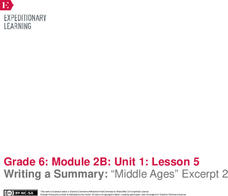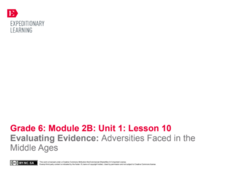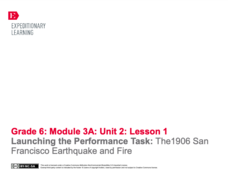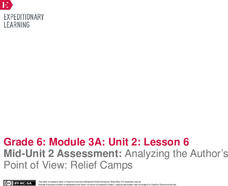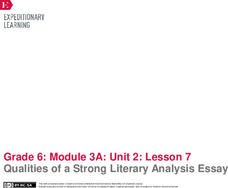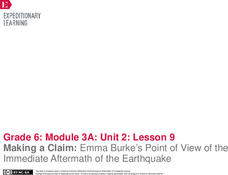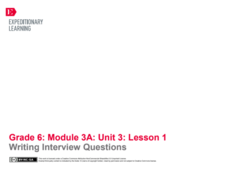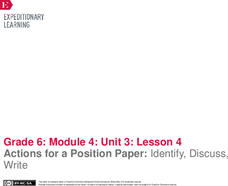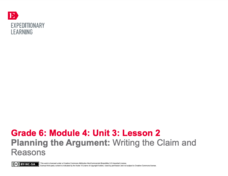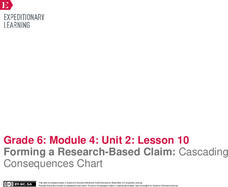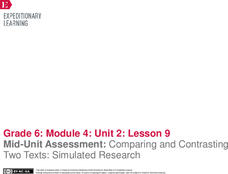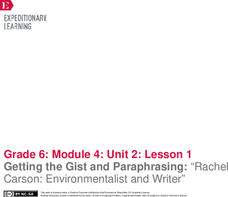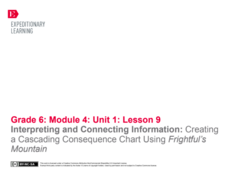EngageNY
Writing a Summary: “Middle Ages” Excerpt 2
What is the big idea? Scholars use Middle Ages Excerpt 2 to complete a summary graphic organizer. They then use the information from the organizer to write a summary of the text on lined paper. Learners share summaries with the class.
EngageNY
Evaluating Evidence: Adversities Faced in the Middle Ages
How is that relevant? Scholars gain an understanding of the words relevant and compelling. They then go back to the End of Unit 1 Assessment Prompt: Adversity in the Middle Ages and look at the second bullet that pertains to relevant and...
EngageNY
Performance Task Preparation: Peer Critique and Mini-Lesson Addressing Common Errors: Revising Draft Essay to Inform
Time to revise! Using a writing evaluation rubric, scholars participate in a peer editing process to provide feedback on each others' informative essays. Next, pupils begin revising their drafts based on the feedback they receive.
EngageNY
Launching the Performance Task: The1906 San Francisco Earthquake and Fire
Picture that! Pupils view photographs of the aftermath of the 1906 San Francisco earthquake and fire, discussing what they know and wonder about each image. Then, scholars watch a short video about the historic event and complete a KWL...
EngageNY
Mid-Unit 2 Assessment: Analyzing the Author’s Point of View: Relief Camps
We're halfway there ... what a relief! Scholars read an excerpt from a primary source about the relief camps associated with the1906 San Francisco earthquake. Next, they complete a mid-unit assessment, answering short-answer and...
EngageNY
Qualities of a Strong Literary Analysis Essay
Read like a writer. Scholars read a model literary analysis in preparation for a similar writing assignment before annotating each paragraph for the gist. Next, pupils devise a list of qualities of a strong literary analysis essay.
EngageNY
Making a Claim: Emma Burke’s Point of View of the Immediate Aftermath of the Earthquake
Sharpen those pencils; it's time to write! Scholars begin writing the first body paragraph of their literary analysis essays. Additionally, pupils use graphic organizers to analyze a character's point of view from Laurence Yep's...
EngageNY
Making a Claim: Moon Shadow’s Point of View of the Immediate Aftermath
Body paragraphs are the building blocks of every essay. Pupils view and discuss a model essay using a rubric to evaluate one of its supporting paragraphs. Next, scholars use what they've learned to continue drafting their own literary...
EngageNY
Writing Interview Questions
And now for the star witness! Scholars take a look at a model newspaper article and discuss the importance of eyewitness accounts. In groups of three, they take turns underlining text from eyewitnesses. They then regroup to talk about...
EngageNY
Performance Task: Hosted Gallery Walk of Scientific Posters
The guests have arrived. Scholars participate in a hosted gallery walk, using their scientific posters to share their research about DDT with their classmates. Then, using sticky notes, individuals leave positive feedback on their peers'...
EngageNY
Actions for a Position Paper: Identify, Discuss, Write
Anchors aweigh, it's time to write! After viewing an anchor chart detailing the parts of a position paper, pupils share their plans for their essays with a partner. Next, they write the rough draft of their body paragraphs.
EngageNY
Planning the Argument: Writing the Claim and Reasons
Step up! Using the resource, scholars discover the six steps to writing an effective position paper. Next, they work on a graphic organizer to begin planning their argument-based essays.
EngageNY
End of Unit 2 Assessment: A Hosted Gallery Walk
Speak your mind. Scholars present their claims in groups of three. They use a presentation checklist as each member takes a turn. At the end of the lesson plan, pupils complete an End of Unit 2 Assessment: Presenting a Claim and Findings...
EngageNY
Forming a Research-Based Claim: Cascading Consequences Chart
Can you put that in writing? Scholars work with a partner to write a practice claim before writing their own claims. After writing their claims, learners share with class using a Concentric Circles activity.
EngageNY
Forming a Research-Based Claim: Creating Stakeholders Charts
Present the facts. Scholars create presentations of their research on DDT using their Cascading Consequences chart and a
Stakeholders Impacts chart as visuals. They discuss the term stakeholders and create a Stakeholders Impacts chart...
EngageNY
Forming a Research-Based Claim: Cascading Consequences Chart
Is it relevant? Scholars choose a resource from their folders and search for relevant information about the harmful and beneficial consequences of DDT. They mark benefits in one color and harmful effects with another color. They then add...
EngageNY
Mid-Unit Assessment: Comparing and Contrasting Two Texts: Simulated Research
Shoo fly. Scholars read DDT Spray Scares Mosquitoes Away, Study Finds and You Think You Have It Tough? to complete a mid-unit assessment. The learners compare and contrast author presentation and conduct a credibility check on each...
EngageNY
Resource Materials and Gathering Information: Reading Another “Choice” Text from the Research Folder
Look it up. Scholars use a dictionary and thesaurus to verify the meaning of the research vocabulary words they defined in the previous activity. They then use sticky notes to write a synonym for each word. Finally, individuals choose a...
EngageNY
Research Tasks: New Words, Relevant Information, Revision
Word builders. Scholars participate in a mini lesson about affixes. They then complete a research vocabulary organizer and share their definitions of the words with the class. They gather more evidence for their research from the...
EngageNY
Getting the Gist and Paraphrasing: “Rachel Carson: Environmentalist and Writer”
Don't copy me. Scholars prepare to dig in with an introduction to their research folder and a discussion about plagiarism. They then review the meanings of harmful and beneficial and how the words apply to the use of DDT. They finish the...
EngageNY
Interpreting and Connecting Information: Creating a Cascading Consequence Chart Using Frightful’s Mountain
Decisions, decisions. Scholars take a close look at making decisions by discussing the character Sam in chapters one through eight of Frightful’s Mountain. Partners discuss whether Sam should interact with Frightful and then complete a...
EngageNY
Mid-Unit Assessment: Tracing an Argument in an Article and a Video
Pesticides—unnecessary pollutants or positive application? Learners watch a video about DDT and read Rachel Carson: Sounding the Alarm on
Pollution for their mid-unit assessment. They complete graphic organizers, answer multiple-choice...
EngageNY
Using Multiple Resources of Information: Creating a Cascading Consequences Chart about DDT and Practicing a Fishbowl Discussion
For every action there is a consequence. Scholars continue their work on creating a cascading consequence chart about DDT using Welcome Back, The Exterminator, Rachel Carson: Sounding the Alarm on Pollution along with graphic organizers...
EngageNY
Conducting Research: Asking and Answering our Questions about Rainforest Arthropods
Let's ask an expert. Scholars divide into groups to research and become experts on either ants or butterflies. Learners use task cards and text on their topic to complete a note catcher. At the end, they share their information with a...
Other popular searches
- Ela Test Preparation
- Ela Worksheets
- Sequencing Worksheets Ela
- Ela Enrichment Activities
- Reading Ela Test Preparation
- Ela Lesson Plans
- Ela Lessons
- Physical Disabilities Ela
- Common Core Ela
- Ela Test Preparation Answers
- Guided Reading Lesson Ela
- Ela Quiz Grade 3


